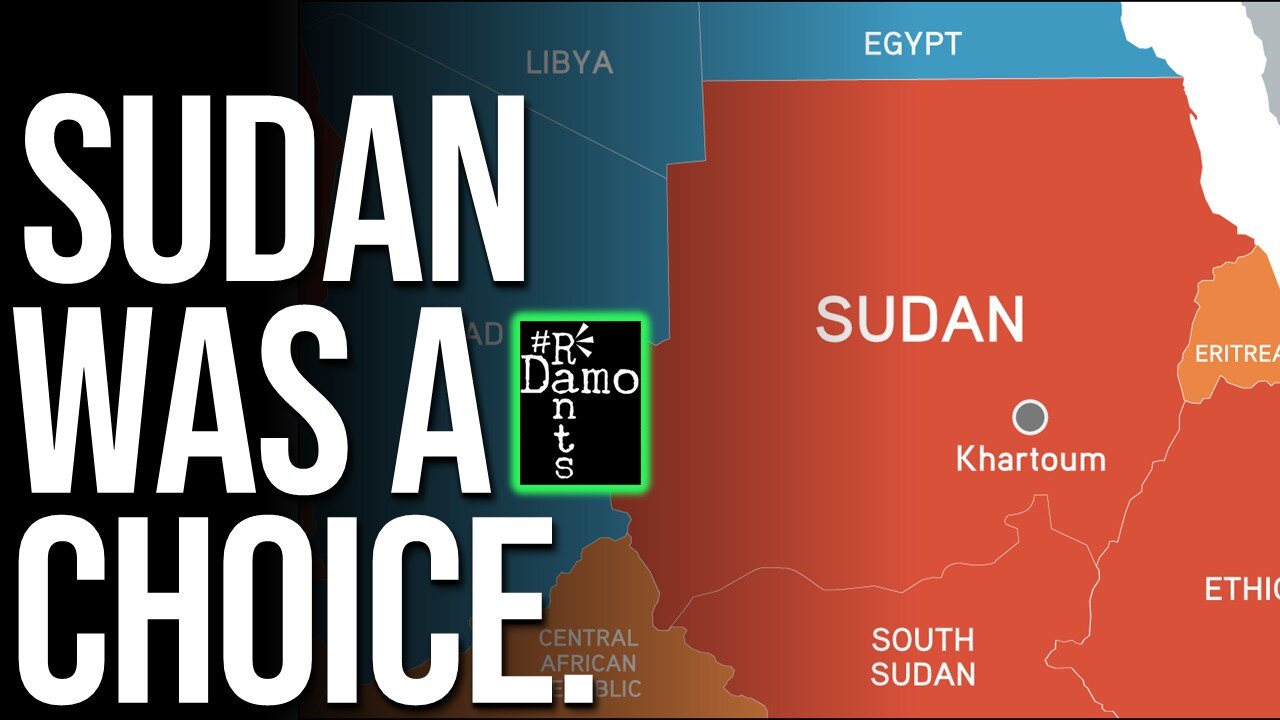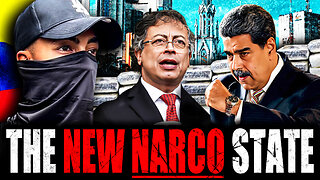Premium Only Content

Something Just Shifted in Sudan — And It Shows
Right, so they’ll tell you Sudan is a tragedy. That it is distant, unfortunate, chaotic, one of those conflicts the world can’t quite get a grip on. But that’s not true. Sudan is not a tragedy. It is, at least in part, an accounting decision. The UK cut its aid budget back in in 2020. Folded Department for International Development into the Foreign Office. Scattered the people who know how to stop mass killings before they start. And when Sudan fell in 2023, when the Rapid Support Forces were burning homes in Geneina and the likes of Human Rights Watch was calling it ethnic cleansing, the Foreign Office sat down and looked at four options. One of those options was civilian protection. But they decided to say balls to that and picked the cheapest one instead. Because the question was never “How do we stop this?” The question asked instead was “What’s the price of Sudanese lives?” And they priced them out accordingly.
Right, so back in 2020 the UK government cut the foreign aid budget from 0.7 per cent of national income to 0.5 per cent. It was presented as a financial adjustment, a necessary step due to economic pressure, more cuts, more austerity as we’ve become sick and tired of here, all framed in the language of responsibility and tightening belts, we’re all in this together and all of that chuff, but the effect was structural and long-term. Billions of pounds were removed from the systems designed to prevent and mitigate humanitarian collapse. This was not a single-year measure that snapped back. It became the new baseline, a new normal, a quiet reduction in capacity to act before violence escalates. It did not make headlines in the language of crisis. It made headlines as policy, cutting foreign aid was made to sound reasonable, better them than us. And policy feels bloodless in the moment it is announced. But policy is what determines whether, three years later, civilians live or die when a state fractures.
The same year the Department for International Development was folded into the Foreign and Commonwealth Office to create the Foreign, Commonwealth and Development Office. A department that existed specifically to intervene in crises before they became mass graves was dissolved into an institution that measures outcomes in terms of diplomatic leverage and strategic relationships. The separation between humanitarian need and political interest was removed in a single administrative motion that most of us when we read it likely skipped over, without realising the potential ramifications of that. What had been a system built to ask “how do we protect people?” became a system that now asked “how does this align with our global positioning?” The shift was not presented as a retreat from atrocity prevention. It was presented as efficiency. But efficiency in government language often means the removal of friction, and friction is what slows decisions that cost lives. The specialists who understood how to prevent genocide did not disappear overnight, but their teams shrank, their budgets narrowed, and authority moved upward into structures where humanitarian concerns are one input among many rather than the priority.
By 2021 and 2022 the consequences were already set. Stabilisation teams were smaller. Early-warning analysis had less reach. Funding for peacebuilding and civilian protection programmes was less flexible. The UK still had diplomats. It still had statements. It did not have the machinery it once had to intervene rapidly when a conflict broke open and targeted violence began though. And then Sudan broke open.
The fighting began in Khartoum in April 2023. The Sudanese Armed Forces and the Rapid Support Forces fought in the capital, but the city is not a battlefield in the way maps describe battlefields. It is where people live. Roads became front lines. Homes became firing positions. Civilian escape routes closed quickly. Communications networks failed or were deliberately cut. Electricity grids collapsed under strain or sabotage. People tried to leave but found the roads already controlled or dangerous. The war did not begin at the edges. It began in the centre. And when a war begins in a city, civilians have nowhere to go.
The RSF moved in Darfur in that same period. They knew Darfur. The group had originated from the Janjaweed militias responsible for the Darfur genocide back in the 2000s. In 2023 in Geneina, they moved through neighbourhoods where the identity of the residents was known and marked. Masalit communities were targeted. Houses were burned. People were killed in the street or at checkpoints. These were not allegations waiting for confirmation. They were recorded, witnessed and repeated by independent bodies. Displacement surged. People fled into Chad and across internal borders. Camps filled at speed. Food and medical access broke down. The war had entered its mass casualty phase and it had done so very quickly and was going grossly underreported at that.
While this was happening, the Foreign, Commonwealth and Development Office in London reviewed strategic options for responding to the crisis. Four were evaluated. One of them included an international protection mechanism capable of intervening directly to prevent mass killing. That option was costed. It required funding, diplomatic leverage and sustained political commitment. The question on the table was whether the UK would take a position that translated into civilian protection in Sudan or whether it would take a stance that limited its role to humanitarian support distributed through multilateral channels. And the least costly, least ambitious option was chosen. The option that did not intervene directly. The option that aligned with the reduced aid budget. The option that did not restore the capacity to prevent the violence already documented in Darfur. That became the UK’s strategy.
The war continued across 2023 and into 2024. Fighting expanded into El Fasher in North Darfur. The city became surrounded and supply routes were cut. Reports described shortages of food, medicine and fuel. Humanitarian access was limited or blocked. The siege conditions were documented. The conflict did not recede. It moved outward and inward simultaneously. In Nyala, in South Darfur, the RSF advanced too. Civilians tried to flee. Those who could not remained in place. The war was now not just prolonged. It was entrenched.
During this same period, the Rapid Support Forces received weapons and logistical support from the United Arab Emirates. A UN Panel of Experts verified the external support. The supply line was not speculative. It was recorded in plain language in public documents. The RSF was being armed while carrying out mass atrocities from their backers in the Middle East.
The United Kingdom continued to grant export licences to the United Arab Emirates throughout this period. The export licensing data remained active. There was no suspension of arms exports to the UAE. There were no new conditions linking licensing to the RSF supply chain. The arms relationship continued. No policy statement announced a change.
By the time the Starmer government entered office in July of last year - the funding decisions having taken place under Rishi Sunak, the amalgamation of the Department for International Development with the Foreign Office having happened under Boris Johnson - the documentation of atrocities, the evidence of the UAE supply chain and the scale of displacement were all established. The aid budget remained at 0.5 per cent though. The least ambitious option remained the UK’s strategy. The policy did not shift, no change between the Tories and Labour, oh what a surprise I hear you say - not.
The conflict continued of course, into this year. The displacement surpassed ten million people, according to UNHCR. Camps remained overcrowded. Humanitarian access remained insufficient. The war did not end. In terms of scale Sudan eclipses the likes of Gaza several times over.
There is no speculation required to describe this. There is no need to infer intention. The sequence is all documented. The decisions are all recorded. The consequences are horrifically visible. The United Kingdom did not fail to prevent the atrocities in Sudan. It had already dismantled the capacity to prevent them. The cost of cuts, the price of austerity again. And when the moment came when prevention was possible but costly, it selected the option that aligned with the budget cut. Sudanese civilians were not protected. Not because it could not be done. Because it was not chosen.
The conflict moved through 2024 with no meaningful pause. In Khartoum the front lines shifted block by block, ownership of neighbourhoods changing depending on which group had ammunition or numbers that week. In Darfur the RSF remained the dominant force. In parts of Kordofan the fighting took on a slower pattern, a grinding movement that left civilians exposed without any clear route out. The war did not behave like a conventional conflict with campaigns, pauses, negotiations and treaties. It behaved like a dissolution. A state was dissolving in real time, and in the spaces where the state had dissolved, armed groups acted without restraint. The documentation of killings, torture, sexual violence and disappearance accumulated steadily, not as allegations but as recorded events. Reports were issued. Witness statements were taken.
In El Fasher, the siege conditions hardened. The city became a pressure point in the conflict. Supply routes in and out closed. Food prices rose beyond what most civilians could afford. Medicine ran out. Hospitals functioned until they could not. Aid convoys could not reliably enter. Humanitarian agencies issued statements about the situation but lacked the capacity to change it. Civilians inside El Fasher rationed what they had. Those who attempted to leave faced RSF positions outside the city. The siege was not symbolic. It was functional. A city of people was being squeezed.
In Nyala the conflict moved through the districts in phases. Some areas saw fighting for days, others saw standoffs, others saw armed presence and intimidation rather than open confrontation. People left when they could. Many could not. The war’s geography was not fixed lines. It was shifting, unpredictable and violent in a way that made planning an escape nearly impossible. Families moved from one neighbourhood to another in sequence, searching for safety that did not exist. There was no corridor. No internationally enforced exit route. The state was fragmented, and the institutions that might have coordinated protection had already been weakened before the conflict began.
International agencies tracked displacement as it increased. UNHCR recorded more than ten million displaced people inside and outside Sudan. This number did not represent a single wave of movement. It represented movement over time, as towns emptied, as camps formed, as borders became waiting rooms. Camps in Chad swelled. Conditions inside the camps were documented as limited in water, food, sanitation, medical care and shelter. There were reports of disease. There were reports of starvation. There were reports of violence inside displacement zones. There was no large-scale intervention to stabilise conditions. The war continued.
Throughout this period the Rapid Support Forces maintained a supply line that linked directly to the United Arab Emirates. The RSF was not simply a militia sustained by internal resources. It was externally supplied. The source of the supply was known. The documentation was public.
The United Kingdom continued to grant arms export licences to the United Arab Emirates throughout this time. The export licensing database remained active. Licences for categories that include small arms, support equipment and dual-use items continued. There was no public record of suspension. There was no public record of new conditions being applied to licensing on the basis of Sudan. The arms export relationship between the United Kingdom and the United Arab Emirates remained in place while the RSF, supplied by the UAE, carried out documented mass killings in Darfur.
Inside the UK, statements about Sudan emphasised humanitarian concern. Funding commitments were described. The UK expressed support for international diplomatic attempts to bring the conflict to negotiation. But the strategic framework remained the one selected in 2023: humanitarian support without civilian protection intervention. The position did not shift.
The approach to Sudan under Starmer has remained aligned with the least-ambitious option selected under the previous government. The policy did not change when the government changed. Statements about concern did not translate into a change in the protection strategy. The approach remained the same.
Diplomatic reporting described the UK’s position on Sudan’s political future as one based on the principle that the United Kingdom recognises states rather than governments. This position meant that if the RSF were to become the governing authority in Sudan, the United Kingdom could continue to engage with the state through intermediaries, as it does in Afghanistan after the Taliban takeover, without formal recognition of the governing group. Smoke and mirrors diplomatic relations. The position allowed the United Kingdom to maintain access and engagement regardless of the identity of the actor in power. The UK will deal with anyone if it suits us under that doctrine therefore. The position was not conditional on accountability for mass killings. The position just remained.
The conflict in Sudan did not resolve. The violence in Darfur continued. The siege in El Fasher intensified. Displacement continued. Camps remained overcrowded. Food insecurity worsened. Humanitarian access remained limited. The war was ongoing.
The structure of the sequence does not require interpretation. It does not require an explanation of intent. It does not require speculation about motive. The record stands.
The United Kingdom reduced its aid budget in 2020.
The United Kingdom dissolved the department responsible for independent humanitarian protection capacity.
The United Kingdom did not restore that capacity.
The conflict in Sudan began in 2023.
The RSF carried out mass killings documented as ethnic cleansing.
The United Kingdom evaluated civilian protection options and selected the least-ambitious and least costly. A decision that essentially said Sudanese lives were cheap.
The RSF received weapons and logistical support from the United Arab Emirates.
The United Kingdom continued to export arms to the United Arab Emirates.
The Starmer government maintained the existing policy when they came to power.
The conflict continued.
The displacement increased.
The civilian casualties increased.
There is nothing abstract about the sequence. The connection between decisions and outcomes does not need to be stated. It is visible.
Sudanese civilians were not protected.
Not because the United Kingdom lacked information.
Not because the United Kingdom lacked options.
But because the United Kingdom had already chosen the conditions in which protection would not be pursued, and then chose again not to restore it.
The war has not stabilised in 2025. The front lines have not formalised into a stalemate with negotiation space. They remained fluid. The RSF continues to consolidate influence in Darfur and corridors of trade and movement around it. The Sudanese Armed Forces retain control in parts of the east and north. The areas between these zones remained contested, which meant civilians continued to move through uncertainty rather than escape. There was no point at which the violence paused long enough to allow meaningful rebuilding, relocation or structured humanitarian access. The conflict remained active and ongoing.
The displacement figures continued to rise. UNHCR maintains its displacement tracker. The number have passed ten million. It is one of the largest displacement crises in the world.
The situation in Sudan is one of sustained conflict, widespread displacement, extensive documented atrocities and limited humanitarian access. The RSF remains the dominant armed actor in Darfur and parts of other regions. The Sudanese Armed Forces remain in control elsewhere. The conflict remains very much unresolved. The displacement iss ongoing. The killings continue. The documentation continues. The UK policy still remains unchanged.
This sequence is not ambiguous. It does not depend on speculation. It does not rely on interpretation. It does not require inference.
The UK reduced its aid budget in 2020.
The UK dissolved DFID and integrated humanitarian protection into a foreign policy framework.
The UK did not restore the capacity that had been removed.
The conflict in Sudan began in 2023. The warnings of uprising in Sudan were present at that time.
The RSF carried out mass killings that have been documented as ethnic cleansing.
The UK evaluated options and selected the least ambitious.
The RSF was armed and supplied by the United Arab Emirates.
The UK continued to export arms to the United Arab Emirates throughout, which have in part at least, found their way into the hands of the RSF.
There is nothing left to interpret. The meaning is in the order of events.
Sudanese civilians were not protected.
Not because the violence was unpredictable.
Not because the situation was unclear.
Not because the United Kingdom lacked the capacity to understand what was happening.
But because the United Kingdom had already chosen the conditions in which protection would not occur, and chose again not to change those conditions once the outcomes were visible.
This was not failure. This was policy. And still they won’t shift. Perhaps you’d like to ask your MP about that.
Of course as with all wars of such nature, they end up creating refugees and as the war in Sudan kicked off in April of 2023, the then Home Secretary Suella Braverman was quick to claim the Sudanese had legal routes to asylum, when of course they had nothing of the sort. The Sunak government doubled down on its cruelty so check out the details of that story here.
Please do also hit like, share and subscribe if you haven’t done so already so as to ensure you don’t miss out on all new daily content as well as spreading the word and helping to support the channel at the same time which is very much appreciated, holding power to account for ordinary working class people and I will hopefully catch you on the next one. Cheers folks.
-
 18:03
18:03
Nikko Ortiz
2 days agoEBT Meltdowns Are Insane...
52.4K105 -
 2:02:46
2:02:46
Badlands Media
1 day agoDevolution Power Hour Ep. 405: Live from Cocoa Beach
178K64 -
 1:33:56
1:33:56
Man in America
10 hours agoElon Says the Quiet Part Out Loud: AI Will RULE Humans, No More Money, BILLIONS of Robots
48.7K31 -
 51:25
51:25
The Connect: With Johnny Mitchell
11 hours ago $30.93 earnedInside The REAL Narco State: The Colombian Drug Cartels DOMINATING The Global Cocaine Trade
30.1K13 -
 3:57:53
3:57:53
MattMorseTV
8 hours ago $112.55 earned🔴Saturday Night NEWS + DRAMA.🔴
109K63 -
 2:02:09
2:02:09
BlackDiamondGunsandGear
10 hours agoAfter Hours Armory / Leaked GLOCK images / Gunderware
31.2K5 -
 6:19:17
6:19:17
SpartakusLIVE
9 hours agoSaturday SPARTOONS || WZ to Start - REDSEC or ARC Later???
32.3K2 -
 19:23
19:23
Clintonjaws
1 day ago $19.86 earnedKaroline Leavitt STOPS Trump's Meeting & Grills Reporters Leaving Them Speechless
40.1K45 -
 2:02:09
2:02:09
DLDAfterDark
6 hours ago $2.58 earnedYou Keep a GUN Inside Your Draws?? Let's Talk About Your Tactical Undies
20.2K5 -
 7:02:59
7:02:59
DeadMomAlive
10 hours agoFace Paint Satur-SLAY! Fall Pumpkin! #BIRTHDAYMONTH
26.7K5